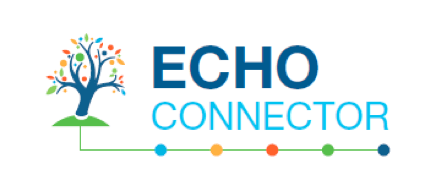
Welcome to the ECHO Connector! The Environmental influences on Child Health Outcomes (ECHO) Program is a research program at the NIH with the mission to enhance the health of children for generations to come. The ECHO Connector will keep you informed of program news and our latest research findings.
Message from Matt
A message from the ECHO Director, Matthew W. Gillman, MD
 Around this time each year, I find myself reflecting on where the ECHO Program was a year ago, where we have gone, and where we are heading. For all of us, 2020 has looked wildly different from all previous years of our lives, and it has come with many challenges. I feel a sense of pride, however, for the way our ECHO teams have stepped up, adapted, and overcome COVID-19-related barriers to continue our important work to enhance the health of children for generations to come.
Around this time each year, I find myself reflecting on where the ECHO Program was a year ago, where we have gone, and where we are heading. For all of us, 2020 has looked wildly different from all previous years of our lives, and it has come with many challenges. I feel a sense of pride, however, for the way our ECHO teams have stepped up, adapted, and overcome COVID-19-related barriers to continue our important work to enhance the health of children for generations to come.
During this past year, the ECHO Program team publicly launched our ECHO Discovery Series and the ECHO Connector and mapped out a plan for this 5th year of the program to ensure we continue down a successful road toward meeting our mission. Our investigators continue their research, both on the observational and intervention fronts, and there are many research results in the pipeline for publication during this coming year.
As we enter Year 5 of ECHO, our plan outlines goals and objectives to foster a collaborative environment so that our investigators can publish important research that will inform healthcare practices, new health programs in our communities, and health policies. In addition to the goals set forth by the ECHO Components, the NIH ECHO Program Office has created a strategic plan that will help steer the program in the right direction. You may read more about this plan below.
2020 has also seen increased engagement with our stakeholder organizations. I hope that you are enjoying receiving these updates on the ECHO Program, and we look forward to sharing many more in the New Year. We hope you have a wonderful and safe end of the year, and we will be back with the first ECHO Connector of 2021 in January.

—Matthew W. Gillman, M.D., S.M.
Back to top
ECHO by the Numbers
Three areas ECHO research aims to inform
As mentioned in Matt’s message above, the ECHO Program is working on important research that will help inform the three areas below:
ECHO Program Spotlight
ECHO Program researcher pairs with teen advisors for input on recruitment materials
Per our guiding principles, engaging with participants for insights about research design, conduct, oversight, and dissemination is a priority for the ECHO Program. It is important to our program that we do not just speak to these values, but that we also adhere to them. When Jessica Snowden, MD, began recruitment for an IDeA States Pediatric Clinical Trials Network study, she did just that.
Dr. Snowden, Associate Professor and Vice Chair of Research in the Department of Pediatrics, College of Medicine at the University of Arkansas for Medical Sciences (UAMS), is leading the Vitamin D Oral Replacement in Asthma (VDORA1) study. Knowing that participant input was an important part of developing materials for a study, Dr. Snowden set out to find willing participants to help her review the study materials.
Fortunately, she had a wonderful resource at her hands. Dr. Snowden worked with eight high school students who had recently graduated from the UAMS Translational Research Institute’s Community Scientist Academy, which is an effort with the Little Rock school district that aims to foster community partnerships with UAMS research.
The high school students jumped right in to help, finding many things that Dr. Snowden said she would have never thought to change and helping her easily communicate a difficult topic. To learn more about this partnership, read a feature here or watch the video below. We would like to congratulate Dr. Snowden on this great work!
Back to top
Featured Publication
Literature Review Finds Connection Between Chemical Exposure and Time to Pregnancy

NYU Langone Health
ECHO researcher Linda Kahn, PhD, MPH, of NYU Langone Health and her research team recently published a literature review in Human Reproduction Update that compared the results of past studies on human-made chemicals and their impact on pregnancy. They found a connection between certain chemicals and time to pregnancy, and also identified chemicals that need further research.
Back to top
News You Can Use
ECHO NIH Program Office Creates Strategic Plan for Year 5
The Environmental influences on Child Health Outcomes (ECHO) Program is an extramurally funded program maintained within the Office of the Director at the National Institutes of Health (NIH). The ECHO Program, currently in its fifth year of funding, has developed a strategic plan to assess the program’s overall direction and to focus its priorities. This strategic plan articulates the mission and vision of the Program Office and will be its roadmap for success over the next five years.
The purpose of this strategic plan is to guide the ECHO Program Office to implement a strategic direction for the next phase of its work, which facilitates a landscape assessment; opportunities to assess staff roles and re-prioritize activities; development of program office strategic goals, objectives, and key measures of success; and information gathering and analysis for continuous improvement.
You can find the full strategic plan here.
ECHO researchers explore validity of shortened social communication questionnaire
Are short questionnaires as valid as longer versions when identifying autism spectrum disorder (ASD) and other social communication behaviors?

ECHO researchers Kristen Lyall, ScD, Craig Newschaffer, PhD, and others hoped to answer this question in their research titled, "Distributional properties and criterion validity of a shortened version of the Social Responsiveness Scale: Results from the ECHO program and implications for social communication research." This publication, featured in the Journal of Autism and Developmental Disorders, examines how well a shortened version of a social communication questionnaire identified behaviors related to ASD and social communication compared to the longer, established version.
More than 3,000 parents from across the United States participated in this study, nearly 200 of which had a child with ASD.
In all, the team found that the short form did well predicting ASD diagnosis and measuring social communication behaviors. These results suggest that shorter surveys can provide correct information about ASD, and at the same time would be quicker and easier for the participant to complete. However, more research is needed to see how the short questionnaire compares in other ways to the longer version.
This work is especially important because it may help address the needs of people who do not have autism but face challenges in social communication and could benefit from help. Additionally, it may help reduce the time it takes to complete surveys while still accurately capturing and addressing social communication challenges in those with and without ASD.
For more information, read the study summary.
November 26 is National Family History Day
One thing we all know Thanksgiving for is a time for families to reconnect and come together. However, did you know it is also an opportunity to connect with family on health and wellness in celebration of National Family History Day? Understanding family history and its effects on child health is a large part of the ECHO Program.
Over half of ECHO cohorts and studies are focused on prenatal health, part of the pre-, peri- and postnatal outcome area of health in ECHO research. The prenatal stage of development is when a child will inherit genes that will ultimately determine their genetic health expressed throughout their lifetime. Genes can determine how a child will look, but also what health conditions they may develop. The prenatal and perinatal stages of pregnancy are also a time when a mother’s environmental factors may affect the child. Understanding how environmental and genetic aspects of family health history may affect the health of children is key to the mission of the ECHO Program to enhance the health of children for generations to come.
Family History Day comes at a great time for the ECHO Program, as our ECHO Discovery presentation this month focused on how family constellations can inform science. Learn more about this session here.
ECHO is committed to helping the public understand how varying factors can affect child health. Some of the ways we do this are through our cohort studies, our ECHO Discovery Series, and by bringing attention to important health awareness days like Family History Day. Learn more about Family Health History Day here.
Back to top
Upcoming Events for You to Join
Date: December 9, 2020 at 1 p.m. EDT
Title: Updates to a Trial as a Result of COVID: iAmHealthy in the ISPCTN
 Speaker: Ann M. Davis, PhD, MPH, ABPP,
Speaker: Ann M. Davis, PhD, MPH, ABPP,
University of Kansas Medical Center
Webex: Meeting Link
Meeting number (access code): 120 176 9919
Meeting password: ECHO
JOIN BY PHONE: 1-650-479-3207
View our most recent ECHO Discovery!
Title: Early Growth and Development Study: How Different Family Constellations Can Inform Science
Speakers:
- Leslie Leve, PhD, College of Education, University of Oregon
- Janae Neiderhiser, PhD, Department of Psychology, Penn State University
- Jody Ganiban, PhD, George Washington University
Back to top
Did You Know

- October 5 was National Child Health Day. The ECHO Program strives to enhance the health of children for generations to come and we are excited to see that others share these values!
- October 15 was Global Handwashing Day. This year, even more than usual, good hand hygiene is extremely important. Let’s keep the effort of Global Handwashing Day going, and encourage our friends and families to do so as well!
- October Sudden Infant Death Syndrome (SIDS) Awareness Month. Pre/peri/postnatal outcomes are one of ECHO’s five areas of health outcomes and we send our heartfelt condolences to those who have suffered a loss.
Back to top

Subscribe to receive a copy of the ECHO Connector newsletter through email.
Questions?
Contact the ECHO Program Office.



